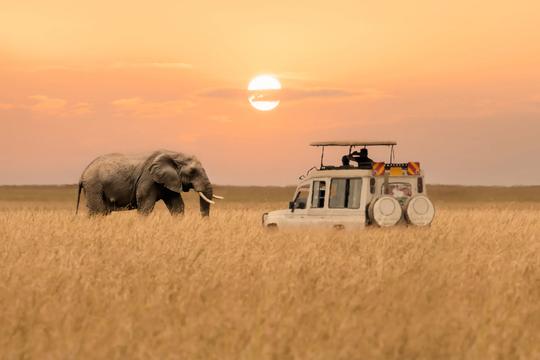
16 can't-miss things to do in Kenya
From safari experiences in scenic national parks to relaxing in sleepy coastal towns, Kenya runs wild with endless adventure
Kenya is a land of wide horizons and wondrous wildlife, wandered by nomadic warrior tribes. It’s easy to see why this East African country is known as the birthplace of the safari (meaning ‘journey’ in Swahili) – flamingos flock to its shimmering lakes in their millions, lions seek shade beneath flat-topped acacia trees and hundreds of thousands of wildebeest, zebras, giraffes and elephants venture into Masai Mara National Reserve during the dramatic annual Great Migration.
As of January 2024, all visitors to Kenya need to fill out an e-visa form before they travel to the country. Applications are usually processed within 3 days, but in some cases, it may take longer. We recommend applying for your eTA two weeks prior to travel.
Visa requirements may change, for the most up-to-date information we recommend using our Entry Requirements tool. Alternatively, check the Kenyan embassy website in your country of departure.
Please note that a yellow fever vaccination is needed upon entry if you’re travelling from these countries in Africa and Latin America.
Other vaccinations to consider include hepatitis a, hepatitis b, rabies, tetanus, yellow fever, meningitis, typhoid, and polio. Antimalarials are also highly recommended.
As advice can often change, you can check out our Entry Requirements tool for the most up-to-date details on vaccination requirements.
While Kenya is a year-round destination, July to October (the dry season) is a particularly good time to visit due to the wildebeest migration in the Masai Mara. Expect fantastic wildlife-viewing, fewer mosquitos, and cooler, temperate weather.
December to February is the high season, which sees warmer temperatures but more crowds. March, April, and May are the peak of the wet season, though the landscapes are green, prices are lower, and you won’t fight the crowds.
Located right on the equator, Kenya has a tropical climate with high temperatures found throughout the year. As with pretty much any tropical destination, there are wet and dry seasons.
There are two dry seasons running from July to October and from January to March. The former is technically the country’s winter, when temperatures are slightly cooler than the highs of 40°C (104°F) in January and February.
The two rainy seasons come in between. The first is the longer rainy season, which runs from April to June. Another shorter rainy season runs between November and mid-December — expect the heaviest rainfall in the former, particularly in May.
In a word, yes, it’s normal to tip for good service in Kenya. 10% of the total bill is standard practice for porters, restaurant staff, maids, and other service personnel.
You can use the following as a guide for staff on your tour if you'd like to show appreciation:
Kenya has some of the best internet connections in the whole of Africa, and there are plenty of places with Wi-Fi in towns and cities all over the country. Of course, when you’re on safari or in more rural areas, expect it to be much harder.
There are over 2,000 ATMs in Kenya, and most accept Visa more than Mastercard. Expect withdrawal fees of around 400-500 KES for each transaction. Credit cards can be used in major cities and towns only, but don't rely on them as a method of payment because they're generally not widely accepted. You should be aware that to purchase products or services on a credit card, a fee of 5%-10% usually applies.
ATMs outside of larger centres can often run out of cash or be out of order unexpectedly. As such, please don't rely on credit or debit cards as your only source of money. A combination of foreign currency and debit/credit cards for cash advances is best.
As currency exchange rates can fluctuate often we ask that you refer to www.xe.com for daily exchange rates.
Homosexuality is still illegal in Kenya and can be punishable by prison time — though in reality, it's unlikely to be enforced. However, you should be aware of the risks and exercise caution whenever you’re travelling within the country.
As part of their commitment, all CEOs receive LGBTQ+ inclusion training so every traveller feels respected and welcomed on all of our tours. We commit to making our tours a safe and inclusive place for people to express their authentic selves without judgment, free from any discriminatory language or harassment.
While travelling with G Adventures, all travellers must treat each other with dignity and respect to create an environment that is positive, safe, and where everyone feels welcome. You can find out more via our LGBTQ+ travel page.
The two official languages of Kenya, Swahili and English, are widely spoken across the country. There are also many different dialects spoken across the country, including Kikuyu, Kamba, Sheng, and Kikuyu.
No, in a word — the tap water here isn’t safe to drink. We’d recommend only drinking bottled water wherever you are within the country.
Please note however that all drinks provided on our tours are safe to drink (including drinks with ice), as well as the water in most hotels and restaurants visited on the tour. If in doubt, please ask your CEO for further information.
The majority of Kenya is safe to travel; however, you should avoid the border areas with Somalia. Big cities need caution here too, particularly at night, as petty crime does exist. Take a taxi when it’s dark and remember that malaria exists here, so bring antimalarials.
G Adventures takes all reasonable measures to ensure your safety and enjoyment while travelling with us. All of the included activities are properly vetted and regularly checked by us, and we take great care in choosing the right transportation, stays throughout your trip, and guides to lead your tour. However, there are always inherent risks when travelling — you can find out more via our travel safety page.